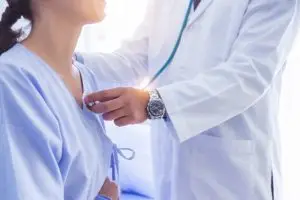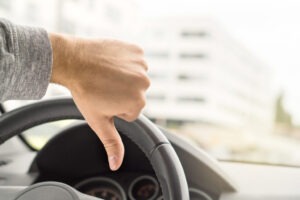
Oftentimes, car accident victims notice immediate signs of injury, for example, significant pain, swelling, or bleeding. Car accident victims frequently experience head injuries, which may result in a loss of consciousness. A forceful impact to the head coupled with a loss of consciousness may be indicative of a traumatic brain injury.
Traumatic brain injuries may cause victims to suffer from confusion and disorientation. Symptoms of traumatic brain injury may be immediately apparent, or they may present themselves much later—days, weeks, or even months after the accident.
For victims who do not experience serious, immediately-visible injuries, adrenaline may leave them feeling shaky, but otherwise fine. Many accident victims walk away from the scene of the accident, seemingly uninjured, only to discover more serious injuries later.
What should you expect after a car accident? What symptoms are normal? Which symptoms indicate a more serious problem? Immediately following an accident, everyone involved should seek a medical evaluation, whether they believe they sustained injuries or not.
A physical exam and evaluation can help rule out serious injuries, many of which may worsen without prompt treatment. A doctor can also provide injured victims with a timeline for their recovery, including what to expect when treating more serious injuries.
Physical Symptoms After a Car Accident With No Serious Injuries
Even if you do not experience serious injuries in a car accident, you may still experience some pain and stiffness in the days and weeks following the accident. As our bodies become aware of an impending accident, our muscles become tense to protect from injury during impact.
When the muscles tighten the areas of the body covered by those muscles are guarded, but as a result, individuals may experience injury in those muscles during an accident.
- Soreness. For some people, soreness sets in a few hours after the accident, especially after sitting down or resting for a while. For others, soreness following a car accident may not become apparent until the following day. Some may experience soreness in the neck and shoulders from whiplash, or notice a nagging ache from muscles all over their body.
- Pain from minor injuries. Injured victims may experience minor lacerations, strains, and sprains in a car accident. The driver of the vehicle, for example, may inadvertently brace against the steering wheel, causing increased soreness in the hands, wrists, and arms in the days immediately after the accident.
- Bruising. Many accident victims note bruising across the chest and abdomen from their seat belt. Seat belts are instrumental in holding occupants in place and preventing or at least lessening the seriousness of potential injuries. However, the rigid strength of a seat belt may also cause injuries on its own. Many car accident victims report notable bruises and scrapes from their seatbelts after a collision. Vehicle occupants may also experience bruising from their body’s impact with objects or items tossed about the car during an accident.
- Stiffness. Due to swelling caused by minor injuries in the accident, injured victims may notice unaccustomed stiffness. It may be several days before the stiffness subsides, enabling individuals to return to their usual activities. Injured victims need to wait to participate in physical activities until they can perform the activity without significant pain. Otherwise, attempting to force the body to return to normal before it is well enough can prolong an injured victim’s recovery. Stretching can help alleviate some stiffness, especially when doing so immediately after waking or standing after sitting for a long time.
Many victims note that pain from muscle tension and soreness peaks several days after the accident itself, then gradually decreases. Visiting a chiropractor or receiving a massage can help ease muscle tension and soreness.
Expect More, Receive More: Legal Support That Feels Like Family
When to Contact a Doctor
At the scene of the accident, many victims believe that they did not suffer serious injuries, so they decide to decline medical treatment. Injured victims may fear substantial medical bills or have a busy day to attend to, so without symptoms of serious injury, they opt to abstain from seeking medical treatment. In some cases, victims may notice their symptoms worsening in just a short period of time, necessitating an evaluation by a medical professional sooner rather than later.
A medical evaluation is imperative for those experiencing any of the following symptoms following a car accident:
- Confusion and disorientation. Any time one loses consciousness in an accident, even for a moment, they should seek an examination to rule out a potential traumatic brain injury. However, some victims of traumatic brain injury may not experience symptoms of confusion and disorientation for days or even weeks after an accident. Some signs of traumatic brain injury include becoming easily agitated, forgetfulness, and an inability to maintain focus and attention. Individuals experiencing any of these symptoms following an accident should visit a medical professional as soon as possible. Symptoms of traumatic brain injuries are prone to worsen without immediate medical treatment.
- Neck and shoulder pain, especially pain that worsens instead of getting better. Some stiffness and mild pain in the neck and shoulders after an accident is typically natural and normal. Usually, these symptoms will resolve on their own within a few days of resting and taking it easy. However, if neck and shoulder pain worsens or continues for an extended period of time, injured victims may be suffering from severe whiplash. Contact a doctor for a full evaluation and treatment of these symptoms.
- Headaches, especially worsening headaches. Many injured victims experience headaches soon after the accident as the levels of adrenaline in their bodies begin to normalize. Others may experience headaches from the stress associated with experiencing a traumatic accident. Neck pain and tension can also contribute to causing injured victims to experience significant headaches. Despite several potential causes of headaches following an accident, injured victims should not ignore any symptoms. If headaches worsen or become persistent after an accident, victims must seek a medical evaluation to eliminate the possibility of more serious injury.
- Abdominal tenderness or pain. As mentioned, accident victims frequently report tenderness and bruising around the areas of the body that are in contact with the seat belt. Abdominal tenderness and pain, however, may be indicative of far more serious injuries than bruising. Individuals who experience persistent or agonizing abdominal pain should seek a medical evaluation to determine whether they are suffering from internal bleeding or trauma to their internal organs.
- Back pain. Some back pain in the days immediately after an accident is likely normal. Individuals who experience sharp, deep back pain that does not resolve quickly, however, should see a doctor as soon as possible. Back pain could be a symptom of much more serious injuries. Around 8 percent of American adults report suffering from chronic back pain, which often causes limitations when returning to work or participating in leisure activities. Seeking prompt treatment, including help from a chiropractor or physical therapist, if necessary, can help reduce pain and suffering and decrease immobility.
- Personality changes. Similar to signs of confusion and disorientation, personality changes may suggest an individual is suffering from a traumatic brain injury. Consult a doctor to rule out more serious injury than originally realized at the time of the accident.
- Numbness. Sensations of tingling or numbness in any part of the body could be caused by swelling in other areas of the body. Individuals experiencing symptoms of numbness should consult with a physician to ensure they have not suffered more serious injuries, including nerve damage.
- Symptoms of Post Traumatic Stress Disorder (PTSD). While PTSD may not express itself through physical symptoms, it can cause substantial limitations on victims’ daily lives. Common symptoms of PTSD following a car accident include fear and frustration when revisiting the scene of the accident or reluctance and hesitation to drive or occupy a motor vehicle. Psychological therapy can help resolve symptoms of PTSD and make it easier to cope with the everyday challenges associated with PTSD.
What Should You Do to Protect Yourself Physically After a Car Accident?
Following a car accident, even without serious injuries, victims may suffer significant pain, stiffness, and even muscular weakness. It can take time to get back to normal. By following the right steps, however, injured victims can protect their future health by increasing their chances of making a full recovery.
After an accident, injured victims should:
- Consult a doctor immediately after the accident. If possible, proceed straight to the emergency room or an urgent care facility after experiencing a car accident. An examination by a medical professional can determine whether victims are suffering from serious injuries that may not immediately exhibit symptoms. Even the most severe injuries, such as spinal cord damage and traumatic brain injury, oftentimes do not display apparent symptoms. Many symptoms of serious injuries may be disguised as minor due to increased adrenaline. By seeking a medical evaluation, injured victims can detect serious injury before symptoms become evident, decreasing the chances of worsening their injuries or prolonging their recovery.
- Follow all recommendations given by your doctor concerning the accident and your injuries. A physician may prescribe specific care and impose physical limitations, including avoiding specific activities for a period of time after the accident. Medical professionals may recommend a treatment plan that includes anti-inflammatory or pain medications to help with functionality in the immediate aftermath of the accident. Injured victims should discuss their plans, usual activities, and needs with their doctor to ensure the prescribed treatment plan is attainable. Recovering from many injuries, including sprains and strains, road rash, or other lacerations requiring stitches or antibiotic treatment, requires adhering to follow-up examinations and care. To ensure a full and fast recovery, attend all follow-up appointments and therapy sessions, even after experiencing relatively minor injuries.
- Hydrate. Increased hydration can help move toxins out of the body and aid in recovery. Many accident victims experience limited mobility as a consequence of their injuries. Injured victims may benefit from keeping a large water bottle nearby, not only to serve as a reminder to hydrate but also to ensure easy access to water without excessive movement. If drinking significant amounts of water becomes unappealing, individuals may try to add fresh citrus juice or other flavorings to make staying hydrated more attainable. Drinking water regularly while recovering from physical injuries can increase the body’s ability to recover and decrease the time required for a full recovery.
- Rest. For many patients, rest proves the most difficult recommendation to follow after any type of injury. Following a car accident, however, rest can help injured victims return to their normal activities sooner. Get plenty of sleep at night, and do not feel guilty for spending a few days hanging out on the couch—rest allows the body to heal itself. Injured victims should inquire when they can safely return to work. Victims experiencing difficulty sleeping or suffering from nightmares or other symptoms of trauma should work with their physician to find a solution to promote adequate sleep.
- Eat healthy. The stress and trauma associated with a car accident often entice victims to indulge in their favorite unhealthy foods. Unhealthy eating habits are a common coping strategy for trauma survivors. While those foods may bring immediate mental comfort, they may not provide your body with the fuel it requires to heal your injuries. Eating healthy, including a diet rich in protein, vitamins, and minerals, can help injured victims heal faster by providing your body with the essential nutrients it needs. Injured victims should try to avoid or drastically limit alcohol consumption throughout their recoveries. Consuming alcohol leaves the body dehydrated and signs of alcohol impairment, including disrupted balance, may lead individuals to worsen their injuries and lengthen recovery times.
- Engage in moderate exercise. While rest often proves essential to accident victims’ recovery, individuals should engage in light exercise, as recommended by their treatment providers. Get up and get moving: take a steady walk around the block, engage in some yoga, or do some light stretching. Exercise improves and strengthens an individual’s circulation, which increases blood flow to injured areas of the body and promotes healing and recovery. Movement can also help decrease swelling associated with accident injuries, which can decrease an injured victim’s pain and discomfort. Injuries often cause stiffness after extended periods of little or no movement. Individuals experiencing muscle pain and stiffness should avoid sitting or laying for extended periods of time. Instead, victims should regularly walk around or engage in low impact exercises or activities. Swimming is a highly recommended low-impact activity that can decrease soreness without added pressure on injuries.
- Give yourself time. Injured victims should not expect to instantly bounce back to normal after a car accident. Even minor or moderate accidents can result in significant pain and stiffness for several days. Injured victims should allow themselves time to make a full recovery. It is important to adhere to treatment providers’ recommendations and timelines for resuming normal activity levels. Of course, after experiencing an injury and progressing through recovery, individuals are anxious to return to normal. However, becoming too active too soon can hinder and lengthen the victim’s recovery.
Each individual’s treatment and recovery will vary following a car accident. Always consult a doctor any time you have questions about your recovery or worry that things have not progressed as they should. If you experience increased symptoms of pain or prolonged immobility, contact your treatment provider as soon as possible to ensure your treatment plan is aiding in your recovery as intended. Contacting a car accident lawyer can help you recoup the costs associated with your treatment plan.






